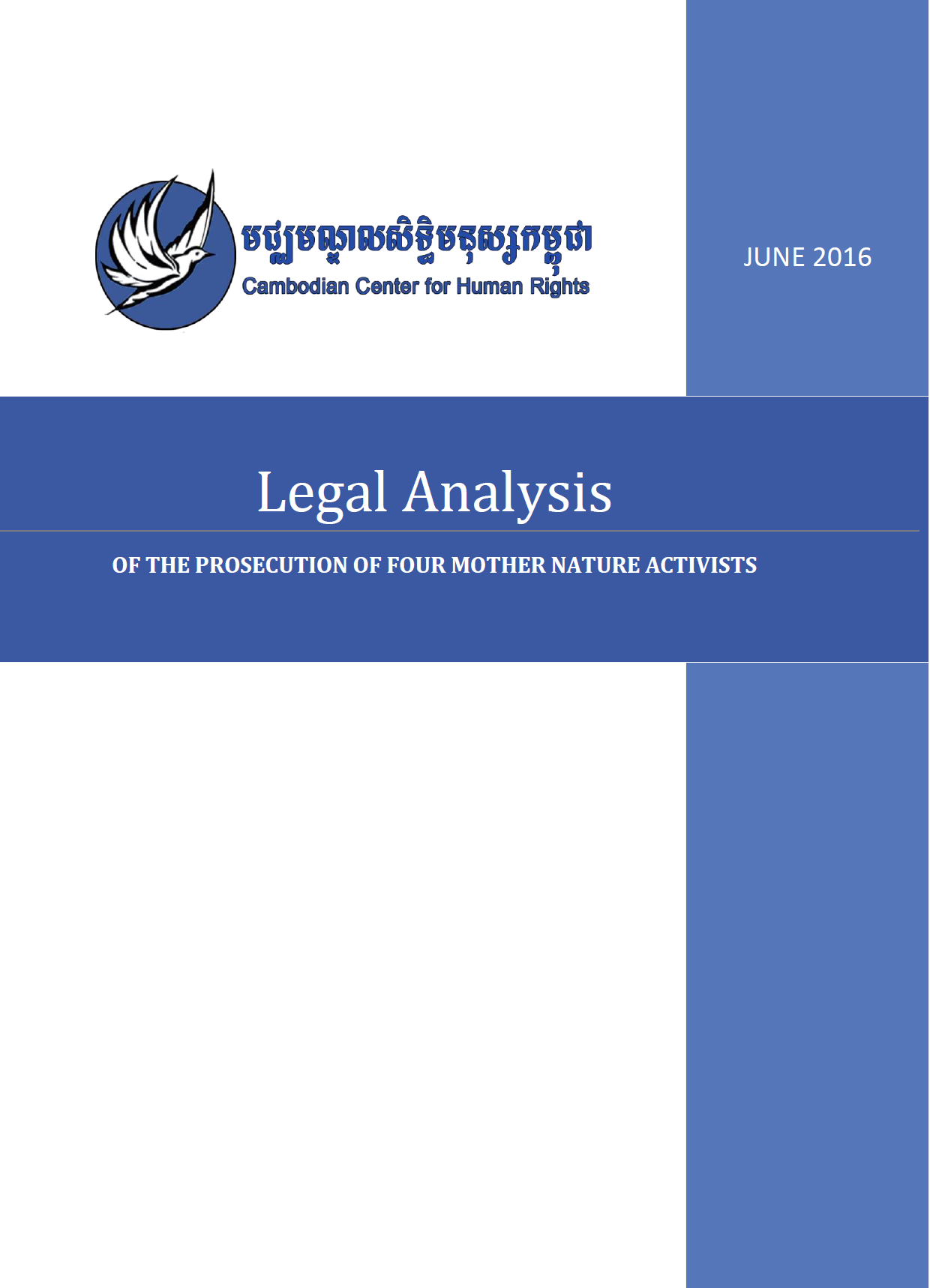
Legal Analysis of The Prosecution of Four Mother Nature Activists
Publication Year: 2016 / Sources: Cambodian Center for Human Rights (CCHR)Legal Analysis aims to examine whether the charging of the four charged persons, along with the lengthy pre-trial detention ofthe three detainees, is reasonable and sufficiently supported by the available evidence. This Legal Analysis:
1. Provides factualcontext and background for the case
2. Introduces the facts of the case, the charges against all four charged persons, thedetention of three of the charged persons, and the enforced exile of Alejandro Gonzalez-Davidson from Cambodia
3. Providesan overview of the applicable domestic law and binding international human rights standards
4. Conducts an analysis of thecharges and applies the law to the reported facts
5. Explores a number of related legal issues, including Alejandro Gonzalez-Davidson’s right to be present at his trial, and the legality of the prolonged pre-trial detention of the other three detainees
6. Concludes that the prolonged pre-trial detention of the three activists is arbitrary, the accessory offense is inappropriate inrelation to Alejandro Gonzalez-Davidson, and the charge against the three detained charged persons is unfounded due to thelack of evidence against those charged.

Corruption and Cambodian Households
Publication Year: 2010 / Sources: PACT CambodiaThe 2010 Corruption and Cambodian Households survey (A quantitative household survey on Perceptions, Attitudes, and Impact of Everyday forms of Corrupt Practices in Cambodia)
The result suggests positive signs in the fight against corruption in Cambodia. Perception of public services and integrity of service and political institutions in Cambodia has improved considerably since an earlier survey in 2005. In particular, there has been a remarkable shift in attitudes towards public services such as health, education, public registry and business licensing. Even perceptions regarding police officers and judges, who scored lowest on the survey, have improved considerably.
Download: English | Khmer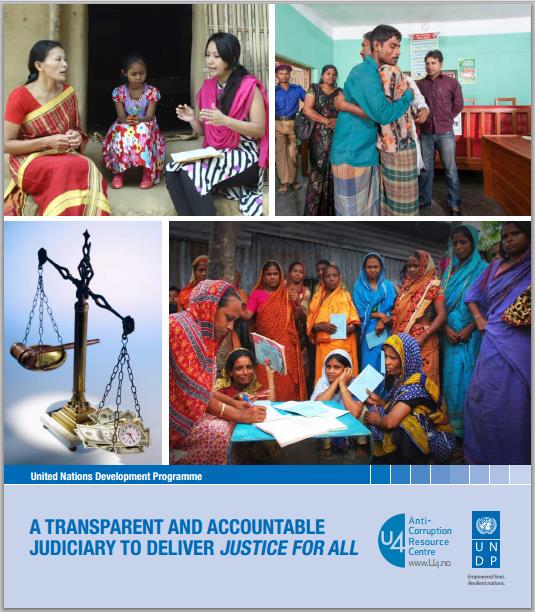
A Transparent and Accountable Judiciary to Deliver Justice for All
Publication Year: 2016 / Sources: U4 Anti-Corruption Resource Centre and UNDPThis report by UNDP and U4 highlights experiences from Afghanistan, Bosnia and Herzegovina, Colombia, Indonesia, Kenya, Kosovo, *Nepal, Nigeria, Paraguay, Philippines, and Somalia in promoting transparency and accountability within the judiciary. It looks at codes of conduct and internal oversight mechanisms for strengthening integrity and accountability, such as judicial councils, and the vetting of judges as an instrument of last resort in contexts of transitional justice. The report also explores the potential of inclusive approaches and the use of new technologies to involve the broader community in judicial reform processes.
Download: English | Khmer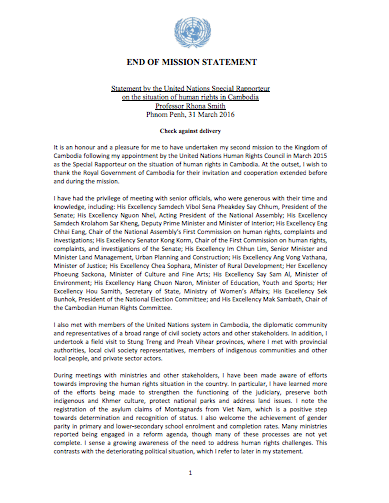
Statement by the United Nations Special Rapporteur on the situation of human rights in Cambodia
Publication Year: 2016 / Sources: Professor Rhona Smith - United Nations Human Rights CouncilThe United Nations Special Rapporteur on the situation of human rights in Cambodia, Rhona Smith, called on the Cambodian authorities to further strengthen the protection of women and indigenous peoples’ rights in the country.
Download: English | Khmer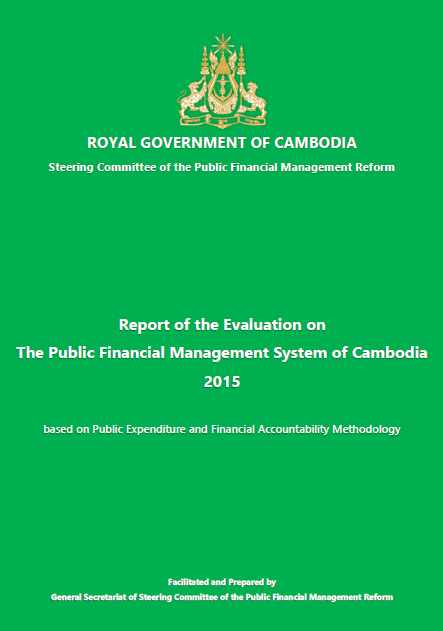
Report of the Evaluation on The Public Financial Management System of Cambodia 2015
Publication Year: 2015 / Sources: Royal Government of CambodiaThis Public Expenditure and Financial Accountability (PEFA) performance assessment – conducted in 2015 – is the second such assessment in Cambodia. The main objectives of the current assessment are to provide a basis for formulating the next action plan for implementation of the PFM Reform Program and to track the progress since the last assessment.
Download: English | Khmer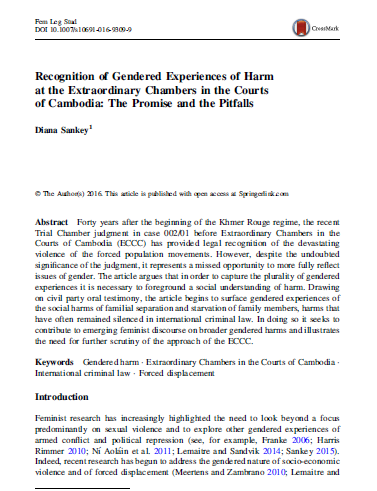
Recognition of Gendered Experiences of Harm at the Extraordinary Chambers in the Courts of Cambodia: The Promise and the Pitfalls
Publication Year: 2016 / Sources: Diana SankeyForty years after the beginning of the Khmer Rouge regime, the recent Trial Chamber judgment in case 002/01 before Extraordinary Chambers in the Courts of Cambodia (ECCC) has provided legal recognition of the devastating violence of the forced population movements. However, despite the undoubted significance of the judgment, it represents a missed opportunity to more fully reflect issues of gender.
Download: English | Khmer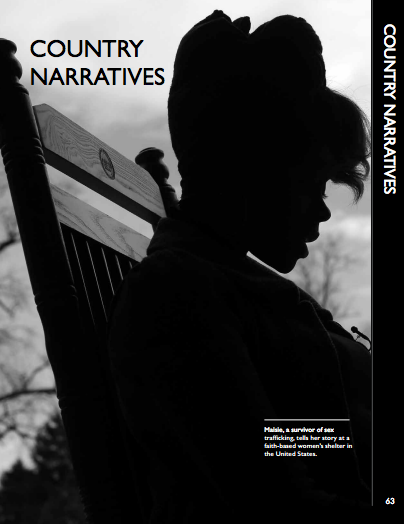
Trafficking In Persons Report 2015 – Country Narratives: Cambodia
Publication Year: 2015 / Sources: U. S. Department Of StateCambodia is a source, transit, and destination country for men, women, and children subjected to forced labor and sex trafficking. Cambodian adults and children migrate to other countries within the region and, increasingly, the Middle East for work; many are subjected to sex trafficking or forced labor on fishing vessels, in agriculture, construction, factories, or domestic servitude.
Download: English | Khmer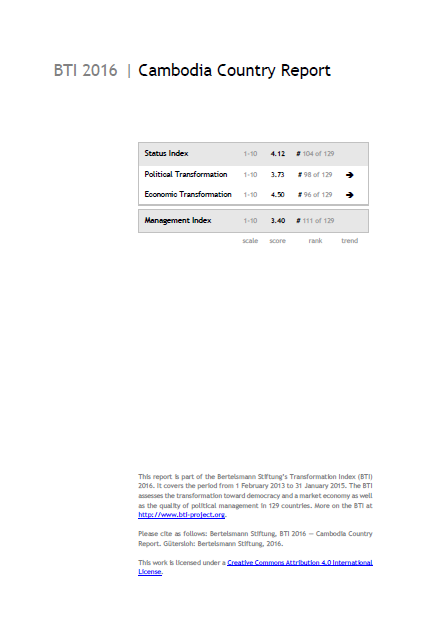
Bertelsmann Transformation Index 2016: Cambodia Country Report
Publication Year: 2016 / Sources: Bertelsmann Stiftung’s Transformation Index (BTI)The BTI measures and compares transition processes in 129 transformation countries with data collected between 2013 and 2015 and establishes their global rating based on detailed country reports. This 2016 report about Cambodia showed the political and economic transformation with the text analysis and numerical assessments.
Download: English | Khmer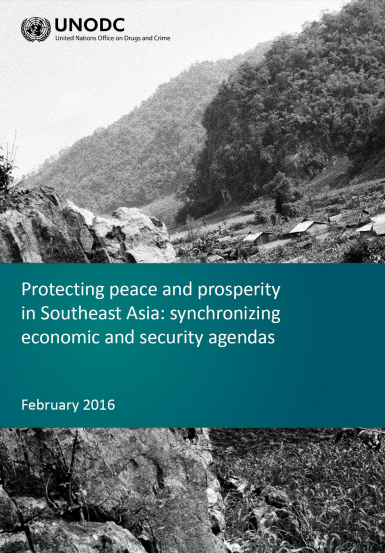
Protecting Peace and Prosperity in Southeast Asia: Synchronizing Economic and Security Agendas
Publication Year: 2016 / Sources: United Nations Office on Drugs and Crime (UNODC)This report outlines the need to strengthen links between Southeast Asia’s economic integration agenda and its security agenda. The region is committed to rapidly developing economic connections but attention is lagging towards the security impacts that accompany these developments. Regional integration expands licit economic opportunities, but illicit markets tend to develop at the same time.
Download: English | Khmer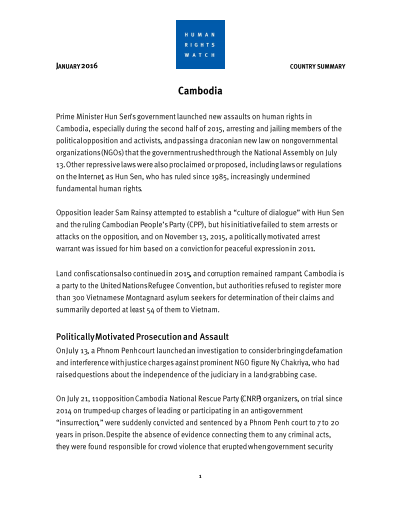
World Report 2016 – Cambodia
Publication Year: 2016 / Sources: Human Rights WatchWorld Report 2016 summarizes key human rights issues in more than 90 countries and territories worldwide. It reflects investigative work that Human Rights Watch staff undertook in 2015, usually in close partnership with human rights activists in the country in focus. This report is the summary of human rights situation in Cambodia.
Download: English | Khmer